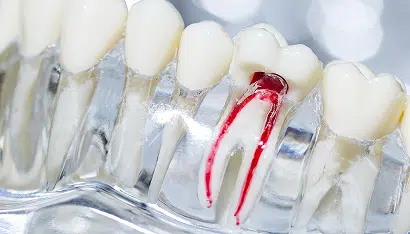That nagging toothache that’s been keeping you up at night might be more than just a minor inconvenience. Your tooth could be sending you urgent distress signals that something serious is happening beneath the surface. Root canal symptoms don’t always announce themselves with dramatic fanfare, but when they do appear, they’re your body’s way of saying “we need professional help, and we need it now.”
At Plaza Dental, we’ve seen plenty of Mackay patients who’ve tried to tough it out, hoping their tooth pain would magically disappear. Unfortunately, dental problems rarely resolve themselves, and ignoring root canal symptoms often leads to more complex and expensive treatment down the track.
The good news? Recognising these warning signs early can save your natural tooth and spare you from the more involved process of tooth extraction and replacement with dental implants.
The Tell-Tale Pain Patterns That Signal Trouble
Pain is usually the first messenger, but not all tooth pain points to root canal treatment. The key lies in understanding the specific characteristics that distinguish root canal symptoms from other dental issues.
Severe, Persistent Toothache
This isn’t your garden-variety sensitivity that comes and goes. Root canal pain typically presents as a deep, throbbing ache that can range from moderate to excruciating. The pain often:
- Worsens when you lie down or bend over
- Intensifies at night when blood flow increases to your head
- Persists even after taking pain medication
- May radiate to your jaw, ear, or other teeth
According to the Australian Dental Association, this type of persistent pain occurs when the dental pulp (the soft tissue inside your tooth containing nerves and blood vessels) becomes severely infected or damaged.
Temperature Sensitivity That Lingers
We all experience occasional sensitivity to hot or cold foods, but root canal symptoms include prolonged sensitivity that doesn’t fade quickly. You might notice sharp pain when drinking hot coffee or cold water, with discomfort that continues for 30 seconds or more after the temperature stimulus is removed.
Pain When Chewing or Biting
Your teeth should handle normal chewing without complaint. When root canal symptoms develop, you might experience sharp pain when biting down on food, discomfort when chewing on one side of your mouth, or tenderness when touching the tooth with your tongue.
Visual and Physical Signs You Can’t Ignore
Sometimes root canal symptoms aren’t just about pain. Your body provides visual clues that something’s amiss with your tooth’s internal health.
Gum Changes Around the Affected Tooth
Healthy gums are pink and firm, but infection can cause noticeable changes including swelling around the affected tooth, redness or darkening of gum tissue, small bumps or pimples on the gums (dental abscesses), and tenderness when touching the gums near the problematic tooth.
Tooth Discolouration
A tooth that’s changing colour might be signalling internal problems. Watch for gradual darkening from white to yellow, brown, or grey, or a single tooth that looks noticeably different from its neighbours. This happens when the blood supply to the tooth’s pulp is compromised, causing the internal tissues to die.
Facial Swelling
Swelling on one side of your face or jaw, puffiness around the eye on the affected side, or tender lymph nodes in your neck can indicate that infection may be spreading beyond the tooth, requiring immediate professional attention.
The Sneaky Symptoms That Fly Under the Radar
Not all root canal symptoms are dramatic. Some are subtle signs that patients often dismiss or attribute to other causes.
- Chronic Bad Breath or Taste: Persistent bad breath that doesn’t improve with brushing, flossing, or mouthwash might indicate bacterial infection inside the tooth or drainage from an abscessed tooth. This occurs because bacteria feeding on infected pulp tissue produce foul-smelling compounds that can’t be eliminated with surface cleaning alone.
- Intermittent Symptoms: Root canal symptoms don’t always follow a predictable pattern. You might experience pain that comes and goes over weeks or months, good days followed by terrible days, or symptoms that seem to improve then return with vengeance. The Australian Society of Endodontists notes that intermittent symptoms can actually indicate progressive pulp damage.
- Sleep Disruption: Many patients with root canal symptoms report waking up with toothache in the middle of the night, difficulty falling asleep due to throbbing pain, or needing to sleep propped up to reduce discomfort. This happens because lying down increases blood flow to your head, intensifying pressure and pain in an infected tooth.
When Symptoms Require Immediate Attention
Some root canal symptoms constitute dental emergencies that shouldn’t wait for a convenient appointment time. Seek immediate care if you experience:
- Severe, uncontrollable pain that doesn’t respond to over-the-counter medications
- Facial swelling combined with fever
- Difficulty swallowing or breathing (though rare, this constitutes a medical emergency)
- Recent trauma to the tooth, even without immediate pain
At Plaza Dental, we maintain emergency appointment availability for urgent cases. Don’t hesitate to call if you’re experiencing severe symptoms.
Protecting Your Tooth After Root Canal Treatment
Once you’ve had root canal treatment, protecting that tooth becomes crucial for long-term success. Root canal therapy removes the infected pulp and nerves, but this also makes the tooth more brittle and susceptible to fracture.
At Plaza Dental, we strongly recommend protecting root canal-treated teeth with crowns. We offer both traditional crowns and CEREC same-day crowns, allowing you to restore and protect your tooth in a single appointment. This approach not only saves you time but also reduces the risk of the weakened tooth breaking before it can be properly protected.
According to dental research, root canal-treated teeth without crowns have a significantly higher failure rate compared to those that are properly crowned. The investment in a crown after root canal treatment helps ensure your natural tooth serves you well for many years to come.
Key Takeaways
Root canal symptoms are your body’s way of alerting you to serious problems that won’t resolve on their own. Persistent pain, prolonged sensitivity, visible changes to your tooth or gums, and systemic symptoms like fever warrant professional evaluation.
Early recognition and treatment of root canal symptoms can save your natural tooth, prevent complications, and often result in more comfortable, less complex treatment. Modern root canal treatment is far more comfortable than many patients expect, with excellent success rates for preserving natural teeth.
Remember that protecting your investment with a crown after root canal treatment is essential for long-term success. Our CEREC technology means you can complete both the root canal healing process and crown placement efficiently.
Experiencing concerning tooth symptoms? Don’t wait for them to worsen. Contact Plaza Dental today to schedule an evaluation. Our experienced team can assess your symptoms, provide an accurate diagnosis, and discuss treatment options including our convenient same-day crown service. Call us on 07 4942 3272 or complete our enquiry form to take the first step towards resolving your dental discomfort.
Frequently Asked Questions
Can root canal symptoms come and go, or are they always constant?
Root canal symptoms can definitely be intermittent, especially in the early stages of pulp damage. You might experience pain for a few days, then feel fine for weeks before symptoms return. This pattern often indicates progressive nerve damage and shouldn’t be ignored, even during pain-free periods.
How can I tell the difference between root canal symptoms and regular tooth sensitivity?
Regular tooth sensitivity typically lasts only a few seconds after exposure to hot, cold, or sweet stimuli. Root canal symptoms involve prolonged pain (lasting 30 seconds or more), spontaneous pain without triggers, night pain, and often don’t improve with standard sensitivity treatments. If you’re unsure, it’s always best to have symptoms evaluated professionally.
Why do I need a crown after root canal treatment?
Root canal treatment removes the infected pulp and nerves, making the tooth more brittle and prone to fracture. A crown provides essential protection and structural support. At Plaza Dental, our CEREC same-day crown technology means you can protect your treated tooth immediately, reducing the risk of complications and saving you additional appointments.









Share this post
Facebook Twitter LinkedIn